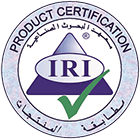| d |
s SN2 SDR 51 |
s SN4 SDR 41 |
s SN8 SDR 34 |
Socket Type |
|---|---|---|---|---|
| 110 | 2.7 | 3.2 | 3.2 | R.R. |
| 125 | 2.7 | 3.2 | 3.7 | R.R. |
| 160 | 3.6 | 4.0 | 4.7 | R.R. |
| 200 | 4.0 | 4.9 | 5.9 | R.R. |
| 250 | 4.9 | 6.2 | 7.3 | R.R. |
| 315 | 6.2 | 7.7 | 9.2 | R.R. |
| 400 | 7.9 | 9.8 | 11.8 | R.R. |
| d | s | Socket Type |
|---|---|---|
| 110 | 3.0 | R.R. |
| 125 | 3.0 | R.R. |
| 160 | 3.6 | R.R. |
| 200 | 4.5 | R.R. |
| 250 | 6.1 | R.R. |
| 315 | 7.7 | R.R. |
| 400 | 9.8 | R.R. |
All PVC pipes from Haykal Plast are 6 meters long and red-brown in color. Other lengths, thicknesses and colors can be manufactured upon demand.






